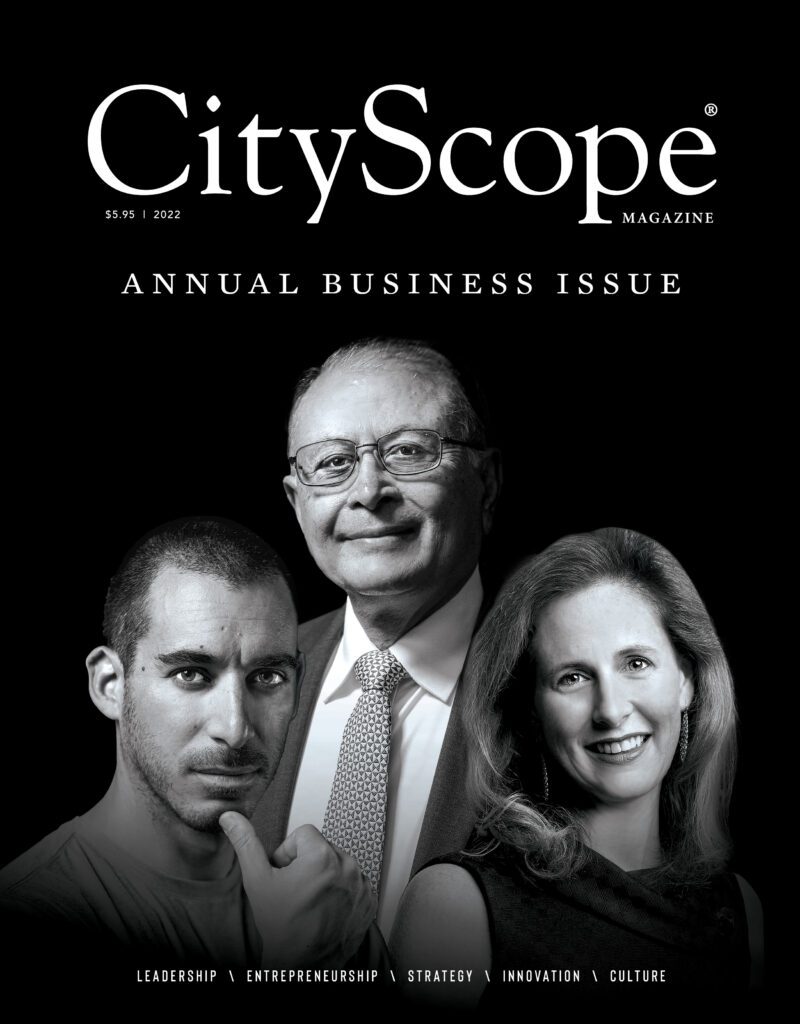By Kathryn Sullivan
The Company: Skuid (pictured above)
The Product: Cloud-based computing software that simplifies processes for enterprises.
Founder and president of Skuid, Ken McElrath, launched his company in 2013 with a specific goal in mind: to deliver on the original promise of cloud computing, where users could merge their data on one platform and eliminate the complexities of working with multiple systems. Companies like Apple and Google have made cloud usage simple and user-friendly on a consumer level, but McElrath had experienced firsthand that using a cloud system on an enterprise level could be challenging and complex.
“Enterprise software treats humans as if they should be expected to act like a computer, but people want their enterprise software to work like an iPhone,” he explains.
Skuid allows enterprises to humanize their software in a way that is cost effective and painless to implement. The software serves clients of all sizes ranging from major Fortune 500 companies to small, local nonprofits. As the company continues to gain momentum, McElrath is looking ahead to allowing Skuid clients to access data from anywhere they want in a way that works best for their individual needs.
“We want to give people access to cloud data anywhere, in a way that makes sense for their job. That’s going to dramatically expand our market potential. If you look at just the cloud enterprise market, that’s basically a $100 billion market. It opens up a world of potential for us and our clients.”

Ambition employee, Jeff McRiffey, works on the company’s sales-based software.ny’s sales-based software.
The Company: Ambition
The Product: Sales-based soft ware designed to improve productivity and boost profits
The founders of Ambition had all experienced jobs in the sales industry and wanted to use software to build a more engaging sales conversation as well as provide a program that would make an employee’s daily job more fun.
Co-founder Jared Houghton explains that while brainstorming ideas, it occurred to the group that they could adapt the paradigm of Fantasy Football to work metrics. The team did exactly that and launched Ambition in 2013.
Through the Ambition software, the results of in-house company sales reps are gathered throughout the day in real time and compared against company objectives. Reps are scored individually and can also form teams, and a manager’s score is the average of his or her employees’ Ambition Scores. The software reports performance statistics which ultimately leads to healthy competition, greater sales performance, and increased profits.
As the company grows, they are working to create a system that looks even closer at individual sales performance. For example, they would know a rep’s all-time best day and would be able to communicate to that employee when he or she is about to break a record.
Houghton explains that the Ambition team wants to give sales reps and their companies more insight into their performance while creating a fun and competitive environment that boosts sales and profits.
The Company: Thinking Media
The Product: STEM-centered software designed to bolster academic and career interest in students for education
Dr. Dane and Sheila Boyington’s earlier software endeavors included the 1997 launch of KeyTrain®, an academic workforce program that was in more than 7,000 locations nationally and has since been acquired by ACT, still operating out of Chattanooga. Under Dane and Sheila’s leadership, Thinking Media moved on to create Learning Blade®, a software system designed to improve interest in STEM (Science, Technology, Engineering, and Math) careers in middle school students. In the year and a half since its launch, Learning Blade® already operates in 20 states and is partnered with Battelle Education.
“We discovered what we call ‘the interest gap’,” Sheila explains. “The number one reason kids don’t major in STEM careers is they don’t know about them, so they aren’t interested.” With this in mind, the Boyingtons developed the software system with gaming aspects to make the programs fun and engaging.
As they expand their program, which will be added into several hundred schools in 2015, the couple is focusing on finding sponsorships from companies and communities that want to impact their community. “If you look nationally, there’s about $1 trillion being spent on STEM, and a lot of that is PR and advertising,” Sheila says. “We have a way for companies and governments to have a direct impact on students even in rural communities.”
The Company: SIGNiX
The Product: Secure digital documentation software for a variety of industries
SIGNiX CEO, Jay Jumper, initially developed the idea for SIGNiX’s software offering from struggles he experienced while owning an online financial services company.
“He was really frustrated with the amount of time, money, and manpower it took to get paper documents signed. It was an online service, so it was really counter intuitive to make people print and sign manually,” says Pem Guerry, Executive Vice President at SIGNiX.
Jumper searched for a solution and discovered a technology developed in the tech incubator at Georgia Tech. He purchased the technology and grew SIGNiX exponentially from there—even posting a 20,000% increase in signature volume from 2010 to 2014.
The goal for the company’s software is to provide customers with a system to sign documents online without risk and with long-term legal evidence. SIGNiX caters to highly regulated industries, like health care and pharmaceuticals, which need their documents to last for years, or even decades, while meeting stringent regulations.
“We use published technology standards,” Jumper says. “Our technology isn’t something that only our software can read, it’s something that any cryptography expert could read and understand, not just today but 10 or 20 years from now.”
Since the ESIGN and Uniform Electronic Transactions Acts were enacted, there has been a huge increase in the number of companies relying on digital documentation. SIGNiX is focused on tailoring their product to their clients, and as they move forward, the company is continuing to expand into other industries as well as grow in the global market.
The Company: WeCounsel
The Product: Telehealth soft ware that connects patients to providers through an online video conference
Harrison Tyner, WeCounsel co-founder, saw a missing piece in the health care industry when he watched a loved one struggle through a tough time without access to behavioral health care. “A tool that connected the providers to the patients remotely would have affected the situation I was observing greatly,” Tyner says.
So in 2011, Tyner founded WeCounsel with the goal to connect mental health care providers to their clients on a digital platform. WeCounsel provides the software to health care professionals who can then offer telehealth as a convenient option for patients.
Since going live in November 2013, the software has impacted several key markets the company had targeted from the beginning, including telehealth service providers, employee assistance programs, and private practice.
“Our goal is to make this a complete online office environment,” Tyner says. “It won’t change any content or treatment plan for any individual patient. It’s the same type of treatment everyone has been getting, it’s just a different modality of treatment.”
The telehealth platform is secure and HIPAA compliant, but due to the private nature of mental health care, the company does still encounter some hesitation about the security of digital sessions. Tyner makes the comparison between his company’s service and the idea of online banking, a very mainstream idea now but one that was initially met with reservations.
“As telehealth becomes more and more prevalent, we’re anticipating a significant upward trend in our growth,” he says.
The Company: Rapid RMS
The Product: Retail-centered technology that streamlines purchases and optimizes business performance
Nirav Patel comes from a family that has been involved in the retail industry for more than 25 years. The Rapid RMS founder grew up working and managing his family’s stores, and he saw that the point-of-sale systems were not providing all the information needed to run the business. His solution? Create cloud-based software that would be easy to use, improve product sales, and save money.
“The cash register was a device that allowed a retailer to bring up a sale and tell a customer the total amount they owed,” explains VP of Sales and Marketing, Monty Bruell. “It didn’t really do anything else for the retailer or consumer. We now have notepad computers, and there’s a lot more capacity and capability there. However, many systems don’t really do much more than the old cash register.”
The Rapid RMS software is designed to capture data and help the retailer optimize the performance of their business. Clients can access their data from anywhere they can get an internet connection.
“You can be home at night, and if you want to see in real time what your closing sales are, you can just log into your home computer,” Bruell says. Rapid RMS is highly suited to retailers looking to expand or companies dealing with managing significant inventory. “I think the future is going to be tied to our ability to provide great data analytics to an independent retailer at a price point they can afford.”
The Company: ReadyCart
The Product: E-commerce technology that increases revenue potential of online videos
Imagine that you’re watching your favorite YouTube personality demonstrate a DIY project you would like to duplicate. If you’re lucky, the person supplies you with a collection of links that direct you to the source of each product used in the demonstration. If you’re not so lucky, actually obtaining all of the necessary supplies becomes a laborious, multi-step process.
Enter ReadyCart. With their technology, YouTube viewers can purchase exactly what they need on ReadyCart, with product transactions passed through Amazon. Tyler Jenks, co-founder and CEO, says the company has set a goal to have ReadyCart on 100,000 videos by the end of 2015.
“There are a lot of tutorial websites, but each was lacking the availability to purchase all the stuff they were talking about,” says Jenks. “You should be able to just click a button and buy everything.”
ReadyCart is setting their sights on a long-term goal that Jenks says will be a game changer. They have found that content creators and the companies that manage them don’t have data that tells them what videos mention what products. Jenks’ company has the ability to create reports and supply that knowledge to the creators, making it much easier for them to sell to brands for advertising.
“We are most excited about being able to illuminate the commercial potential of any video online and generating the click through data and purchase data.”
The Company: AudiencePointe
The Product: Advanced algorithms that help prioritize emails and connect people more efficiently
When Andy Perez received a phone call from a friend who was struggling to raise funds for a non-profit, he was more than happy to contribute. But when his friend told him he’d already sent an email about the situation without receiving a reply, Perez went searching through his inbox, only to find that with the hundreds of emails he was receiving, he was missing some of the ones that mattered to him. It occurred to Perez that the messages appearing at the top of his inbox, or those that arrived during the time he checked his mail, were far more likely to grab his attention and get a response.
In September 2011, Perez formed AudiencePoint. The company’s software uses a complex algorithm to analyze the time and day that individual subscribers are most engaged online. Using that data, AudiencePoint can ensure their clients’ communications arrive to subscribers at the optimal time.
AudiencePoint eliminates time zones, individualizes mass delivery, and automates sending on an individual basis. The prototype tested on Perez’s friend’s non-profit increased giving to the group by 150%. The software now serves clients on a global scale, and the company plans to nearly triple the size of their Chattanooga office this summer.
In an age where digital communication is imperative, Perez’s goal is straightforward. “We want to tell you the best time to reach somebody, how they like to be reached, and what’s relevant to them.”



















